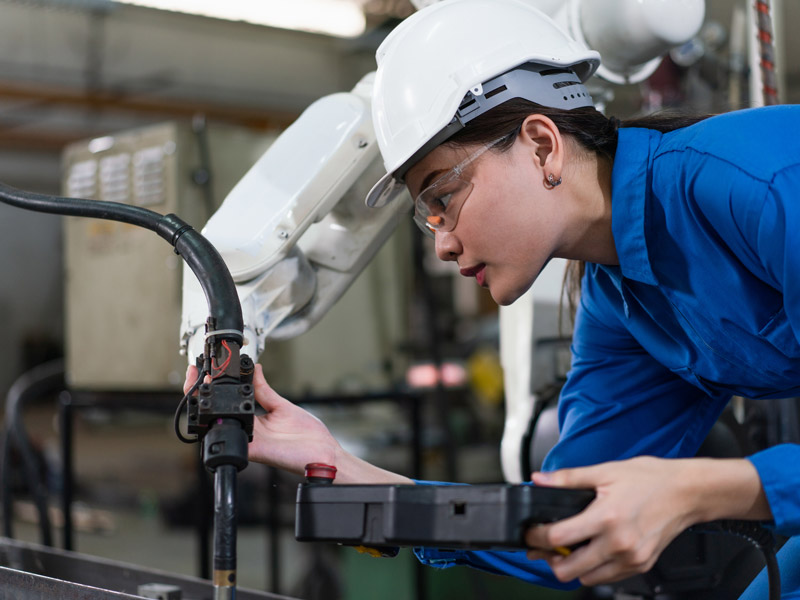Building accessible career pathways for women in STEM

Sponsored by

Sponsored by

Identifying and nurturing talent early on is vital for enabling women to thrive in STEM leadership positions
Universities still have a long way to go to establish accessible pathways for women into STEM careers, said a panel of experts from the higher education sector at THE Campus Live UK&IE 2023. At the round table, held in association with City University of Hong Kong (CityUHK), the panel discussed challenges around the representation of women in STEM careers.
“If you’re thinking about gender balance, or any other diversity measure, only at the time of recruitment, it’s far too late. It has to happen earlier,” said Carsten Welsch, head of accelerator science at the University of Liverpool. “There need to be open and trustworthy conversations with individuals where they can express what they would like to do, where they would like to drive change, and then they need to be empowered to act on that change.”
Early talent spotting and empowering young women to assume leadership roles are effective measures for increasing the number of women in senior-level STEM positions.
It is also important to foster an environment that supports staff with care responsibilities, said Shuk Han Cheng, associate vice-president of research and professor in the Department of Biomedical Sciences at CityUHK. She shared statistics about gender disparity in STEM professions in the UK and Hong Kong, and explained the efforts CityUHK is undertaking to advance gender parity among faculty. “At City University of Hong Kong, we try very hard to increase people’s quality of life and the balance between work and family.”
Cheng acknowledged that care responsibilities disproportionately fall on women. Factoring that into work culture and policies is crucial to ensuring that everyone can thrive in the workplace while balancing their personal responsibilities.
Until early 2023, faculty members in tenure-track positions at CityUHK could request a one-year extension for performance assessments if they were pregnant. “It is now automatically granted," said Cheng. “The message is that even though it is the same treatment that faculty were able to enjoy earlier, to have it as an entitlement rather than as an extra consideration is the kind of environment we are creating at CityUHK.”
“It’s also about educating parents,” said Ruth Greenhalgh, research and knowledge exchange manager at Arden University. She pointed out that the struggles of women in STEM begin in schools where girls may be encouraged to pursue occupations that are traditionally considered feminine, while boys may be pushed into professions such as engineering. “Not many parents have that wider vision of the breadth of jobs that are available for youngsters in science,” she added. “Until we break that up, we’re also going to struggle to get women into STEM.”
C.H. Shek, professor in CityUHK’s Department of Material Science and Engineering and advisor to the Bright Future Engineering Talent Hub, which aims to nurture students for a career in engineering, shared details of a programme carried out at the university to build secondary school students’ interest in STEM careers through hands-on engagement.
Visibility and role models are also important in nurturing talent and attracting women to senior STEM positions, the panel agreed. “It’s about [organisational] culture and making everyone feel that they can see themselves in these roles,” said Paul Davies, dean of the faculty of computing, engineering and science at the University of South Wales.
There also need to be forums in which career opportunities are discussed with women, said Tara Dean, provost at London South Bank University. “Women approach promotion, or indeed applying for positions, very differently from their male counterparts. Having that insight and support is key. Otherwise, we just build the bottom layer and then we lose [women] through the leaky pipeline.”
René Koglbauer, dean of lifelong learning and professional practice at Newcastle University, said that, when it comes to promotion or job applications, “women tend to wait until they tick all the boxes” before they apply. Early talent-spotting is vital for those wanting to increase diversity within their organisations, he said.
To cultivate such a space, Liverpool John Moores University has created two-day writing retreats to support women when it comes to promotion, said T. Komang Ralebitso-Senior, an associate dean for diversity and inclusion within the faculty of science at Liverpool John Moores University. The university also invited recently promoted women to the retreat to share their knowledge.
The panel:
- Christopher Chao, vice-president of research and innovation, Hong Kong Polytechnic University
- Shuk Han Cheng, associate vice-president of research, City University of Hong Kong
- Esyin Chew, director, EUREKA Robotics Centre, Cardiff Metropolitan University
- Paul Davies, dean of the Faculty of Computing, Engineering and Science, University of South Wales
- Tara Dean, provost, London South Bank University
- Jyotveer Singh Gill, associate director for web development and education technology, Saïd Business School, The University of Oxford
- Ruth Greenhalgh, research and knowledge exchange manager at the Faculty of STEM, Arden University
- Jinlian Hu, professor in the Department of Biomedical Engineering, City University of Hong Kong
- René Koglbauer, dean of lifelong learning and professional practice, Newcastle University
- Bahara Parwani, student, University of East Anglia
- Komang Ralebitso-Senior, senior lecturer, Liverpool John Moores University
- H. Shek, professor in the Department of Materials Science and Engineering, City University of Hong Kong
- Andrea Redhead, deputy head of technology and development, Sheffield Hallam University
- Amy Tan, professor in the Department of Architecture and Civil Engineering, City University of Hong Kong
- Carsten Welsch, head of accelerator science, University of Liverpool
Find out more about City University of Hong Kong.